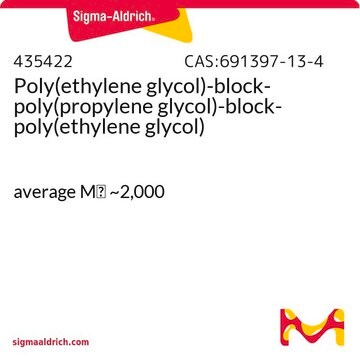435503
Poly(propylene glycol)-block-poly(ethylene glycol)-block-poly(propylene glycol)
average Mn ~3,300
Synonym(s):
Pluronic® 31R1, PPG-PEG-PPG
About This Item
Recommended Products
form
viscous liquid
mol wt
average Mn ~3,300
composition
PEG, 10 wt. %
refractive index
n20/D 1.454
surface tension
34 dyn/cm, 25 °C, 0.1 wt. % in H2O
viscosity
660 cP(25 °C, Brookfield)(lit.)
transition temp
softening point −25 °C
cloud point 25 °C (1 wt. % aqueous solution)
density
1.018 g/mL at 25 °C
HLB
2.0 - 7.0
InChI
1S/C3H6O.C2H4O/c1-3-2-4-3;1-2-3-1/h3H,2H2,1H3;1-2H2
InChI key
RVGRUAULSDPKGF-UHFFFAOYSA-N
Related Categories
General description
Application
Features and Benefits
Legal Information
Storage Class Code
10 - Combustible liquids
WGK
WGK 3
Flash Point(F)
Not applicable
Flash Point(C)
Not applicable
Certificates of Analysis (COA)
Search for Certificates of Analysis (COA) by entering the products Lot/Batch Number. Lot and Batch Numbers can be found on a product’s label following the words ‘Lot’ or ‘Batch’.
Already Own This Product?
Find documentation for the products that you have recently purchased in the Document Library.
Customers Also Viewed
Articles
Mesoporous materials self-assemble from sol-gel precursors and amphiphiles, forming versatile structures for various applications.
Mesoporous materials self-assemble from sol-gel precursors and amphiphiles, forming versatile structures for various applications.
Mesoporous materials self-assemble from sol-gel precursors and amphiphiles, forming versatile structures for various applications.
Mesoporous materials self-assemble from sol-gel precursors and amphiphiles, forming versatile structures for various applications.
Our team of scientists has experience in all areas of research including Life Science, Material Science, Chemical Synthesis, Chromatography, Analytical and many others.
Contact Technical Service







